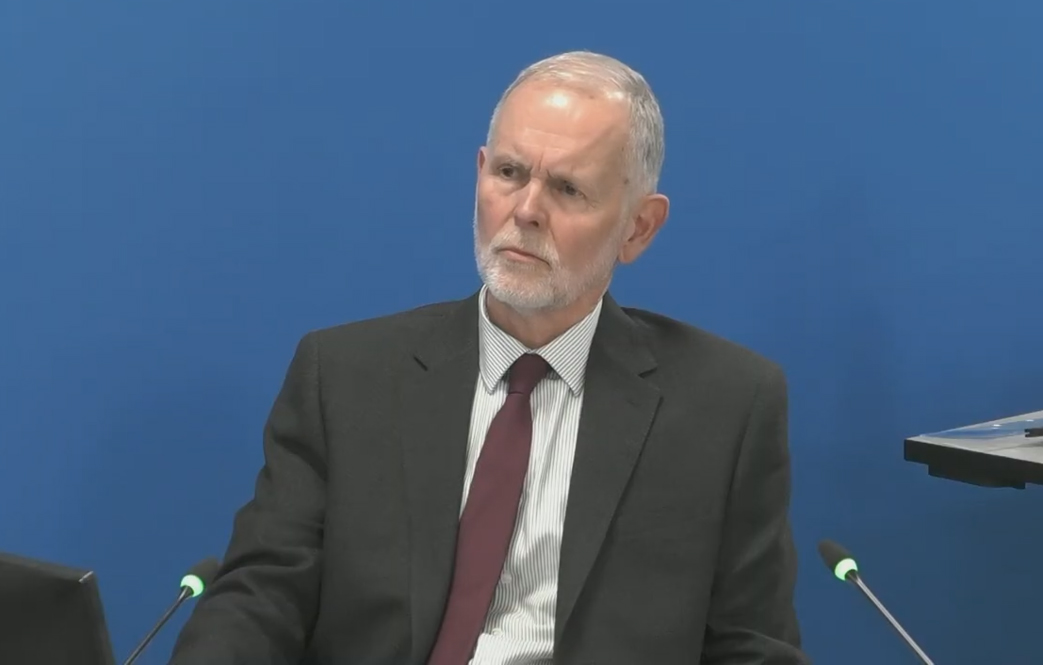Bob Lambert’s First Day at the Public Inquiry

Bob Lambert giving evidence to the Undercover Policing Inquiry, 2 December 2024
Notorious Special Demonstration Squad officer Bob Lambert is giving evidence to the Undercover Policing Inquiry every day this week.
Here’s a quick recap of his opening appearance on Monday 2 December.
The evidence heard by the Inquiry that afternoon will stay in people’s heads for a long time. Those who witnessed what Helen Steel had to say in the morning, especially her closing remarks, will likely never forget the strength of her words and depth of her feelings.
It’s fair to say that the Inquiry, after all the criticism it has received since the controversial announcement a month ago that many of these ‘Tranche 2’ hearings (covering 1983 to 1992) would not be made publicly accessible, managed to surprise everyone on Monday. As the morning session neared its end, we heard that the afternoon hearing would be broadcast on YouTube.
People were even more shocked to then discover that these proceedings would also be streamed live on the BBC’s iPlayer as they happened (both of these with a ten-minute delay, as a safeguard against any ‘blurts’, i.e. someone saying something that is meant to be kept private).
Bob Lambert, arguably one of the most infamous spycops in this ‘Tranche’ duly appeared on our screens at around 2.30pm, and spent the next few hours giving evidence about his time in Special Branch, especially his role in the Special Demonstration Squad (SDS).
We are not providing a full report of what he said here, as it is available to watch and listen to on Youtube.

David Barr KC
But we do want to share some of the observations of those who saw and heard what he had to say on Monday in response to the questioning of David Barr KC, Counsel to the Inquiry.
The public gallery of the hearing room was very full – probably the most people that have attended in person on any date so far – and they were quick to share their suspicions.
According to them, Lambert was ‘playing the part’ of a frail old man, but when he got up to move he didn’t look frail or unsteady at all.
His answers were doggedly slow and ponderous. He appeared to be taking a great deal of care not to answer Barr’s questions too quickly – lest he make any mistakes – and often pretended not to hear, or properly understand, what was being asked of him.
Within minutes of the start, he fell back on phrases we’ve heard before from other spycops officers – ‘I don’t recall’ and ‘I have no recollection’ were his favourites – even with the ‘easy’ questions.
Referring to Lambert’s cannabis onsumption while undercover, one observer commented that ‘All that stuff that he “didn’t inhale” finally caught up with him’.
The live-stream was suddenly cut early on in the hearing, supposedly because Lambert ‘blurted’ something that the Inquiry had ruled should be kept private. Some of those who watched in person believed he’d done this on purpose to derail the session.
It was clear that he often exaggerated things, and made unsubstantiated allegations, ranging from the ‘risk’ animal rights activists would have posed to his family’s safety through to the difficulties an undercover officer would face from activist women continually propositioning him for sex.
The Inquiry repeatedly referred to Lambert’s 2013 account given to Operation Herne, a Metropolitan Police self-investigatoin into spycops, and to his intervew with Channel 4 News the same year.
Tom Fowler commented in a tweet that ‘most of this afternoon has been 2024 Bob Lambert disagreeing with 2013 Bob Lambert about what 1984 Bob Lambert knew’.
There were a few occasions when Barr highlighted such discrepancies and inconsistencies.
For example, Lambert told the Inquiry that he was deployed by his managers to infiltrate the animal rights movement and London Greenpeace, and said that his role was purely to gather intelligence about these groups, the people involved and how they worked.
However, we then heard that back in 2011, in a letter to Spinwatch shortly after his exposure, he claimed that his role as an undercover was to ‘identify and prosecute’. Barr explored this further and Lambert was forced to admit that the unit did not produce evidence that could be used to prosecute anyone, and that he had ‘exaggerated’ to Channel 4.
This Spinwatch letter is full of apologies, and the line:
‘I am grateful to Spinwatch for giving me an opportunity to apologise and also to begin a process on conflict resolution in this difficult and sensitive arena’.
It comes across as a desperate attempt to publicise his latest ‘anti-terrorist’ book at the time, and convince them to continue working with him. Their response was to issue a statement saying that his history meant he was not ‘compatible’ with them.
He also spoke about stealing the identity of a dead child in order to create his cover name, ‘Bob Robinson’. Barr asked if the Home Office knew that SDS officers were using this method, and Lambert said he didn’t know.
However, back in 2013 he appeared in an ‘exclusive interview’ with Channel 4’s Andy Davies (which Andy has also written about) and said otherwise: that the unit and this ‘tradecraft’ was known about in the Home Office, and at the highest levels.
He struggled to explain this on Monday, finally claiming that after ‘further reflection’ what he’d said to Channel 4 was just a ‘general recollection’.
There was some truth in that TV interview. He also said:
‘My reputation is never going to be redeemed for many people, and I don’t think it should be’.
After leaving the police, Lambert re-invented himself as an academic, and there is plenty of footage of him delivering lectures, speaking clearly and fluently. Re-invention is something he excels at.
As the women who were deceived by these men have said, the spycops were professional liars, who were trained, encouraged and incentivised to develop their skills of deception and manipulation.
They were experts at presenting different personalities to suit different audiences, to say the ‘right thing’ in each situation to engineer trust, influence people’s thinking, and sometimes to ‘shit stir’, sow mistrust and ill-feeling,
Over the past few weeks we have heard from a whole string of activists, all of whom were spied on by Lambert. They’ve described him as a confident, exceptionally charismatic, charming man, someone who was very articulate, highly intelligent, and almost always sporting a ‘big smile’. This description does not match the man we saw on Monday.
Which side of Lambert will he choose to show us for the rest of the week?
(You can hear more about what people thought of Monday’s evidence in the Twitter space hosted by Tom Fowler).
